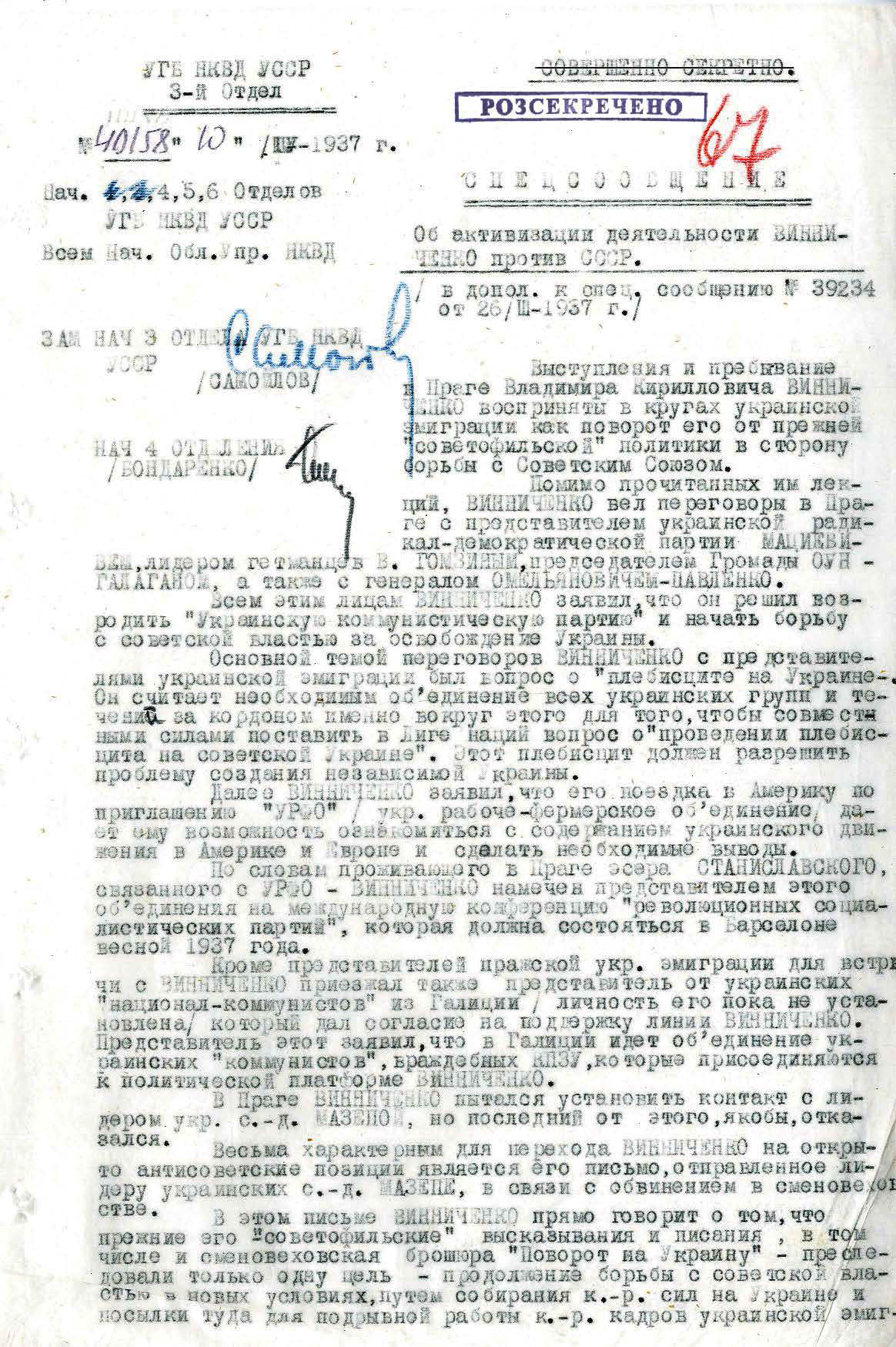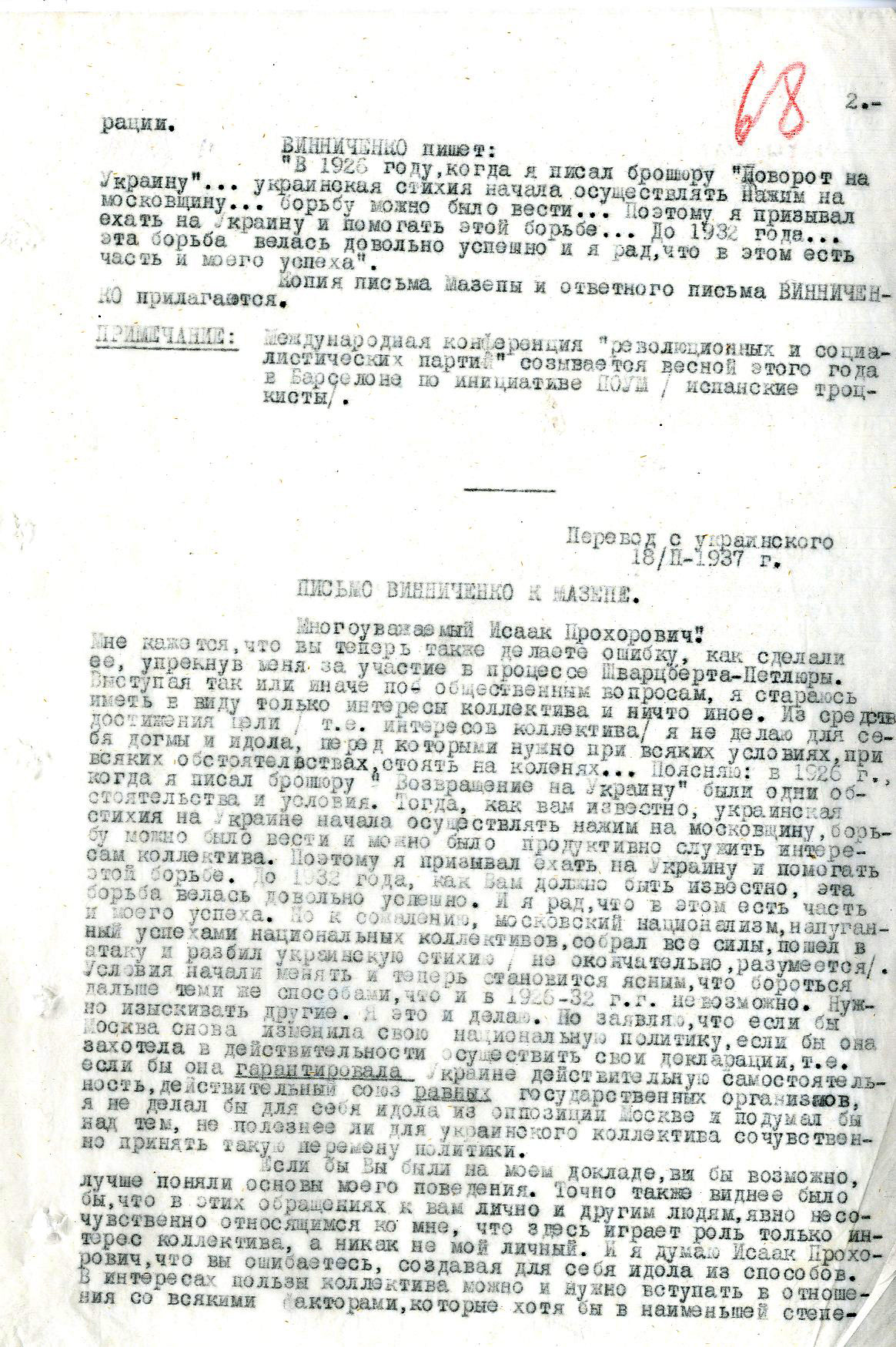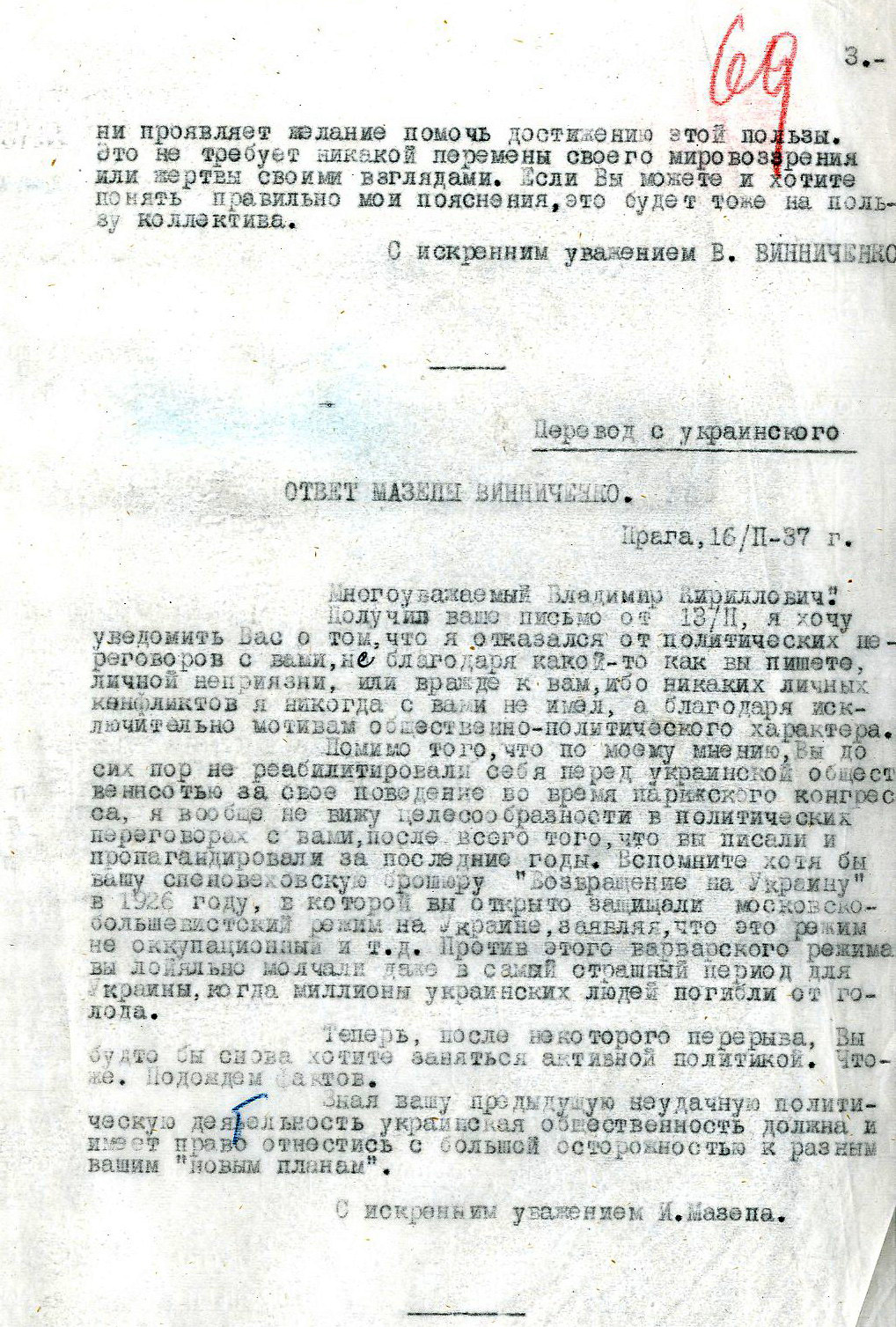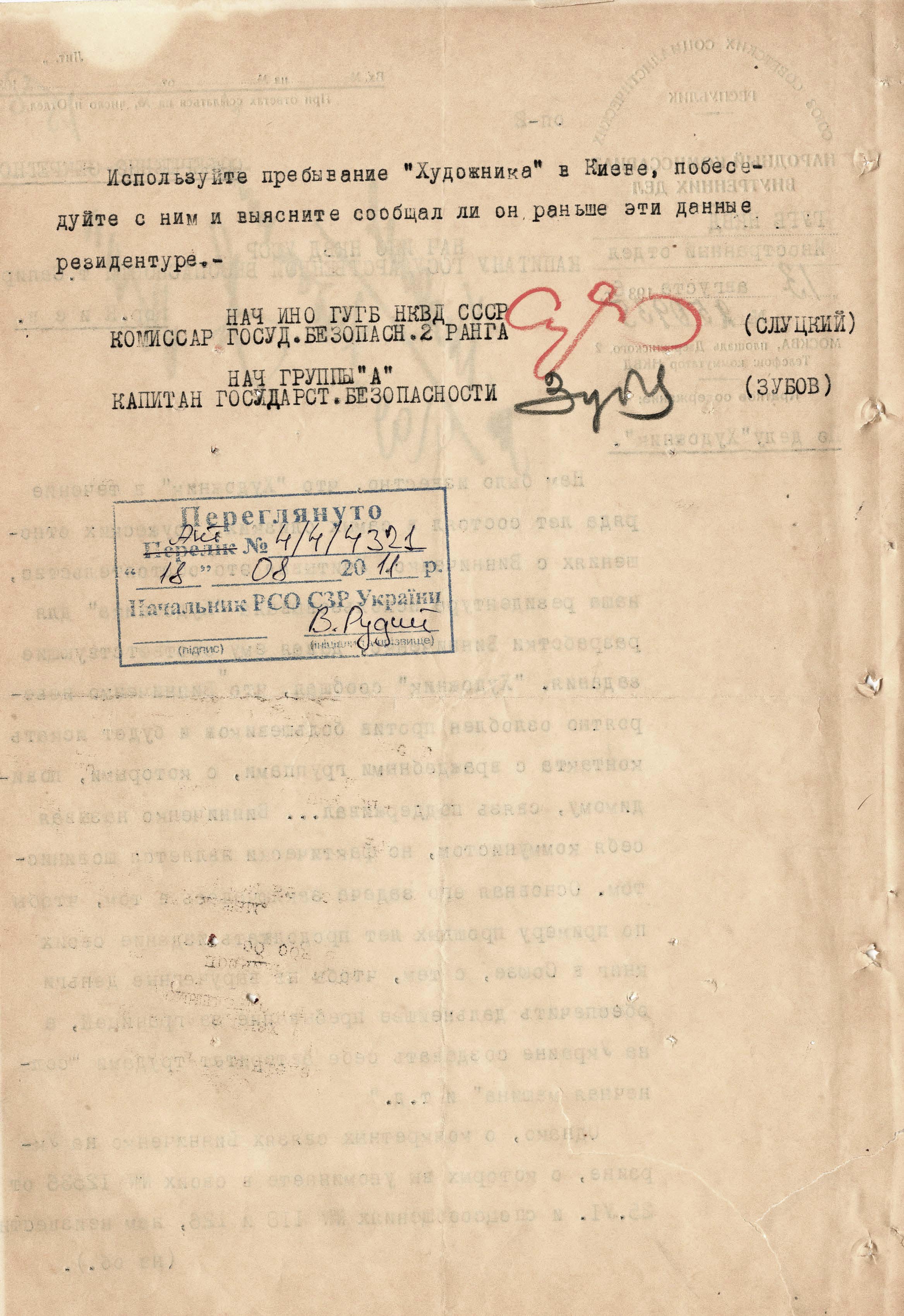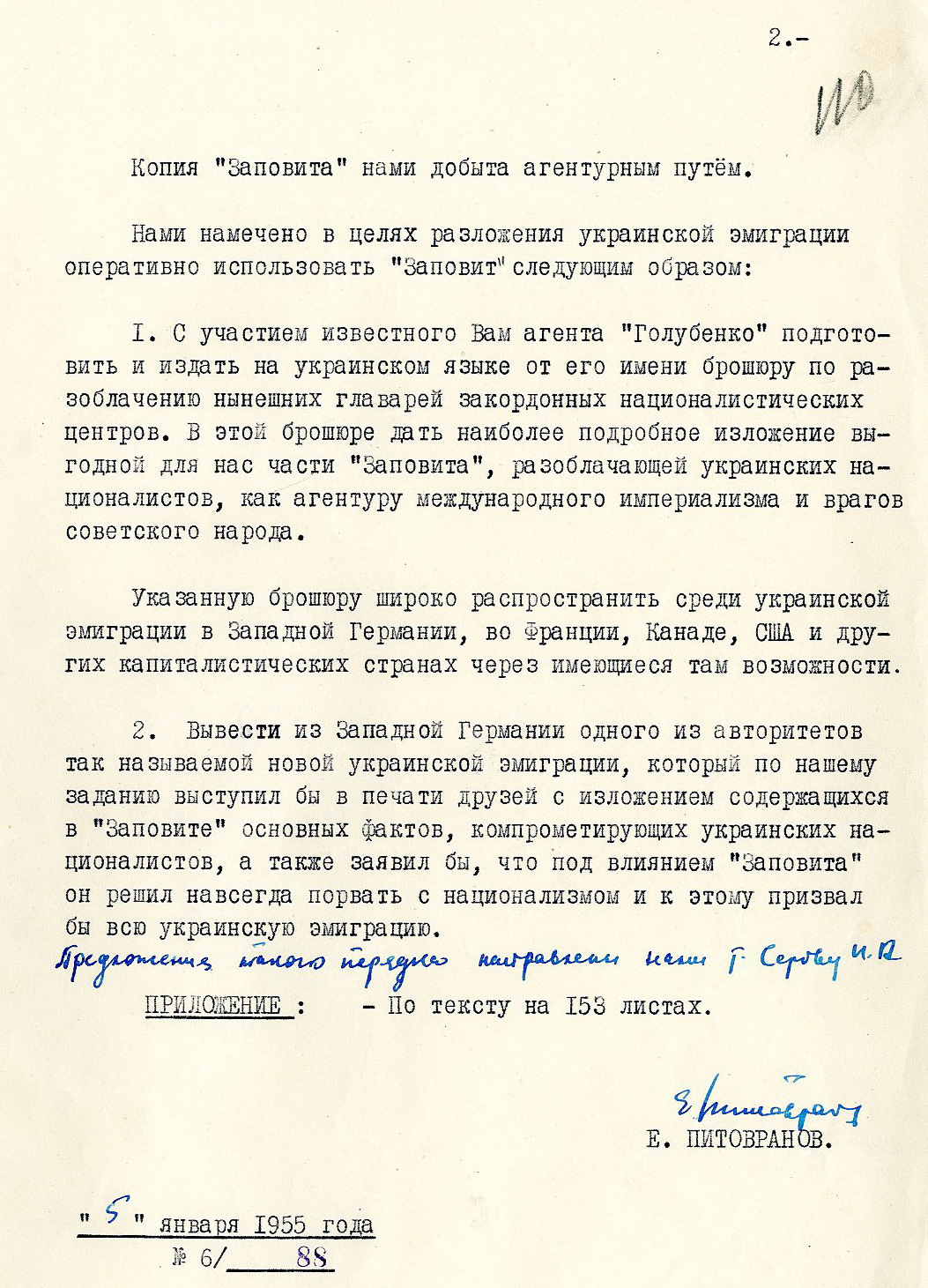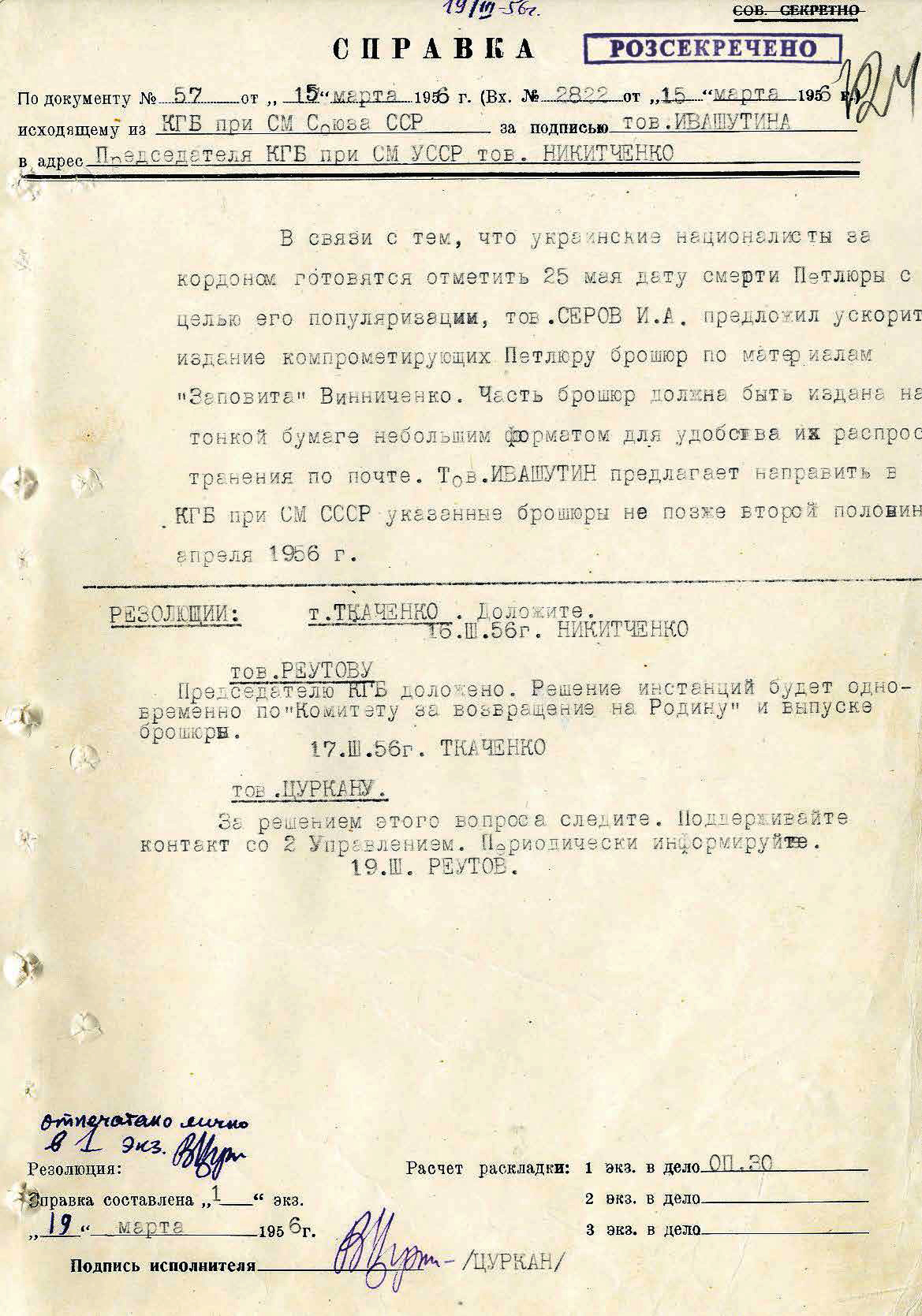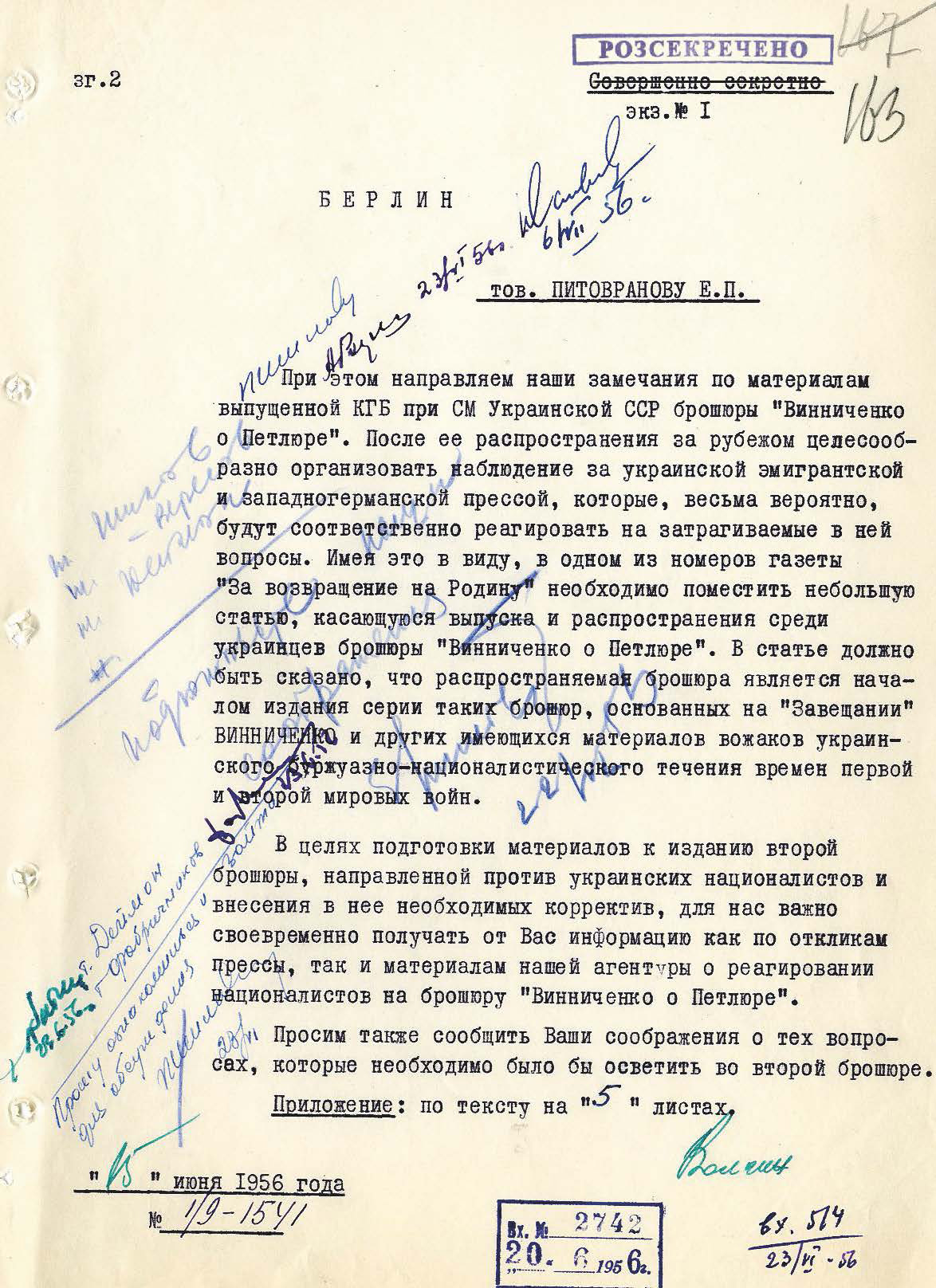Volodymyr Vynnychenko. “For What Ukraine?”
12/15/2023
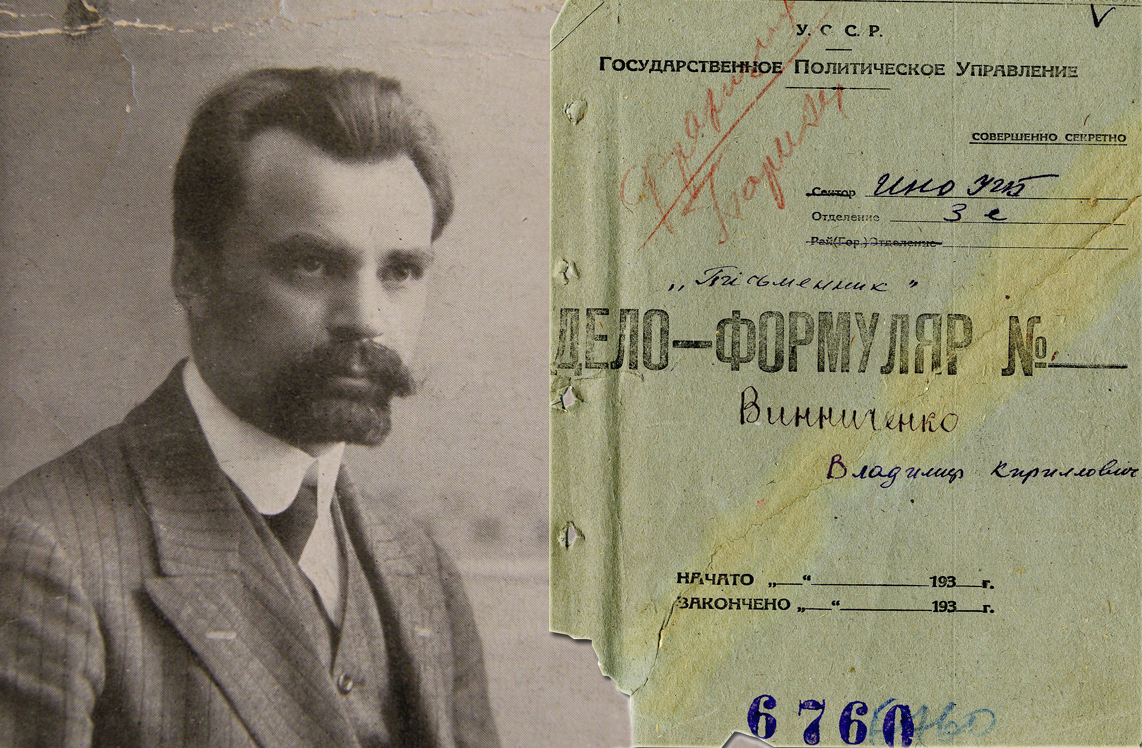
In the archival funds of the Foreign Intelligence Service of Ukraine, there is a file-form on one of the leading figures of the Central Rada, the first head of the Ukrainian government (General Secretariat) and Directorate of the Ukrainian National People's Republic, Volodymyr Vynnychenko. The materials collected in it show that the kremlin leadership and the gpu/nkvd/kgb bodies constantly kept him in their sights and tried to use the change in his political views, mistakes and ambitions for their own purposes, in particular to discredit and finally bury the idea of restoring Ukraine's independence. Declassified documents show how it was done during the life of the famous politician and writer and even after his death.
“ V. Vynnychenko’s Works Are of Historical and Cultural Value”
On June 28, 1990, Director of the T.H. Shevchenko Institute of Literature of the Academy of Sciences of the Ukrainian ssr, Academician of the Academy of Sciences of the Ukrainian ssr Ihor Dzeverin, Deputy Director of the Institute, Corresponding Member of the Academy of Sciences of the Ukrainian ssr Mykola Zhulynskyi, Chief Researcher of the Institute, Academician of the Academy of Sciences of the Ukrainian ssr Leonid Novychenko, Head of the Institute's Department, Academician of the Academy of Sciences of the Ukrainian ssr Dmytro Zatonskyi, Scientific Custodian of the Institute's Funds Serhiy Halchenko, Director of Maksym Rylskyi’s museum, Bohdan Rylskyi were invited to the building of the KGB of the Ukrainian ssr at 33, Volodymyrska Street at 4:00 p.m. That event did shake the scientific and literary community of Kyiv. The echo reached moscow.
What was happening behind the doors of the kgb of the Ukrainian ssr was reported by the leading Ukrainian republican newspapers and even some moscow ones, there was a large story in “Aktualna Kamera” on UT-1 and a 20-minute broadcast on Ukrainian Radio. Unlike the events of the early 1970s, when writers and literary critics Ivan Svitlychnyi, Vasyl Stus, Vyacheslav Chornovol, Yevhen Sverstyuk, Iryna Kalynets, Ivan Dzyuba and others were brought to the premises of the kgb in Kyiv and Lviv for interrogation and arrest, this time there was a different reason. Distinguished academicians and media representatives were invited to hand over (in a solemn atmosphere) Volodymyr Vynnychenko’s letters and individual works to the Department of Manuscripts of the Institute of Literature.
It was one of the first public events of the kind, when the kgb of the Ukrainian ssr tried to demonstrate a certain openness in working with the public, in access to archival documents, and in rehabilitating victims of the stalinist regime. The press-conference was hosted by Yevhen Marchuk, whom representatives of the literary environment perceived better than other leaders of the republican committee. In his speech, he spoke of Volodymyr Vynnychenko as a talented writer whose works are of historical and cultural value. He pointed out that the materials, which had been stored in the kgb archive for decades, should become available to researchers, literary critics and general public.
Among the documents transferred under the act, there were the materials of the gendarmerie of the russian empire’s surveillance of V. Vynnychenko, biographical certificates, correspondence with publishing houses of the soviet Ukraine and individual figures (about 200 originals and copies of letters), a photocopy of the typewritten text on 140 pages of the “Testament to Fighters for Liberation”, etc. All this – in two volumes of the archival case file.
At the press conference, the role and place of V. Vynnychenko in Ukrainian history were avoided and his political views were not assessed. There were certain reasons for this, including the documents that were kept in the first volume of the case and from which the seal of secrecy had not been removed yet. The organizers of the event got acquainted with those reports, certificates, the gpu, nkvd, kgb of the Ukrainian ssr’s conclusions in advance. And after that they decided not to mention them at all. Suffice it to quote the final paragraph in the general report on V. Vynnychenko, dated August 1969. It says the following:
"Describing Vynnychenko, the Ukrainian soviet encyclopedia points out that he “stood on nationalist positions in his political views, spoke for appeasement, sought a compromise between the classes and eventually slipped into a counter-revolution... All his political activity was aimed at separating the Ukrainian people from the russian people. In his writings abroad, although he sometimes resorted to criticizing some groups of Ukrainian bourgeois nationalists, he nevertheless remained on the positions of Ukrainian bourgeois nationalism” (BSA of the SZR of Ukraine. - F. 1. Case 6760. - Vol. 1. - P. 189).
Such characteristics did not make it possible to speak, even in 1990, from the rostrum of the kgb about V. Vynnychenko as a prominent figure in Ukrainian history. And what happened to other documents that were kept in the archive? What did V. Vynnychenko look like in the eyes of soviet special services of that time?
“For an Independent Ukraine with a Socialist or Communist Government”
The first volume of the case, which was not shown at the press conference, begins with documents dated June-July 1934. In them, the head of the foreign department of the gpu of the Ukrainian ssr volodymyr karelin informed the moscow leadership about receiving intelligence from agents abroad on the increase in V. Vynnychenko’s activity. At this, it was stressed that, in general, the activities of this “famous Ukrainian writer, who at one time headed the Central Rada of Ukraine”, his environment and ties are of great interest to the gpu.
The gpu was well aware of all the past attempts of V. Vynnychenko to find an understanding with soviet authorities. In particular, about his secret negotiations with the bolsheviks for the overthrow of Hetman Pavlo Skoropadskyi and putting forward the condition of Ukrainization in exchange for soviet power in Ukraine. They had information about his attempts in 1919 to create a new party in exile, the social program of which would imitate the bolsheviks’, but would be more Ukrainian. During that period, he organized the Foreign Group of Ukrainian Communists in Vienna.
“After the victory of the soviet government in Ukraine”, says one of the documents, “at the end of 1919, Vynnychenko left for abroad, where he continued active political activity. On behalf of left-wing socialists abroad, he tried to negotiate with the soviet government about the recognition of the so-called “Ukrainian soviet independence” (BSA of the SZR of Ukraine. - F. 1. Case 6760. - Vol. 1. – P. 183).
The gpu also remembered his attempt to return to his Motherland in 1920. Then, together with his wife, he arrived in moscow, where he received an offer to take the post of the deputy chairman of the council of people’s commissars of the Ukrainian ssr with the portfolio of the people's commissar of foreign affairs and the possibility of joining the central committee of the cp(b) of Ukraine. But soon he realized that they just wanted to take advantage of his past authority and would not allow him to implement his ideas. Therefore, he rejected all the offers and left for abroad again.
V. Vynnychenko continued his political activity in Austria, Czechoslovakia, Germany and France. He was mostly engaged in literary activities. His works were published in the soviet Ukraine, in particular, the novel “Solar Machine” was widely published. For this he received considerable fees. However, after he wrote (in 1933) an open letter to the politburo of the central committee of the communist party of Ukraine with accusations against stalin and postyshev, he was declared an enemy of the soviet government, his books were withdrawn from sale and royalties were stopped.
The full text of this letter is not included in the case file. Instead, excerpts from it are cited from the brochure published in Paris in April 1934 entitled “For What Ukraine”. The chekists paid great attention to this brochure for good reason. The answer can be found in one of special messages. It states that in the brochure, V. Vynnychenko dwells in detail on his attitude to the soviet government, that government’s attitude to him, and gives an answer to the question “what Ukraine should be fought for, what Ukraine should be defended”.
“You, comrades, who hold in your hands the leadership of the entire policy of the Union”, the quotation from the letter reads, “are mostly russians, either by origin or by perception. Since childhood, you have been accustomed to a certain attitude to the national question in russia from the angle of the dominance of russian culture and nationality... russian revolutionaries have always had this subconscious perception of national relations, reflected in the mind by a contemptuous and hostile interpretation of national problems as bourgeois ones...” (BSA of the SZR of Ukraine. - F. 1. Case 6760. - Vol. 1. – P. 9).
In the brochure, V. Vynnychenko considers himself a “victim of great-power chauvinism” and declares that soviet party leaders did not take advantage of his desire to return to the ussr and participate in the construction of socialism. He categorically protests against attempts to make him an enemy of socialism and an agent of imperialist states.
In a special report, it is noted that V. Vynnychenko, drawing attention of the ussr government to the dangers of great-power chauvinism and russian nationalism, “resolutely declared: “For the spiritual revival of the Ukrainian working masses, soviet socialist Ukraine is more beneficial, even if chained to the russian nationalism”. And in answer to the question, for what Ukraine he stands, the following words from the brochure are quoted: “For soviet, socialist Ukraine, in the closest union with other soviet republics”.
And then there is his appeal to all working people of Ukraine: “Stand with all your strength for Ukraine of the working people, for Ukraine “without a slave and without a master”, that is, for Ukraine without classes, without class, social, national or any other exploitation and domination of some people over others; for Ukraine, which in torments and pains in union with other fraternal countries of workers is creating its new, own life, for soviet, socialist Ukraine. Don't spare anything, build it with insane perseverance and defend it from foreign and “inner” enemies – national and class, by all means and methods, with all your blood, health and life” (BSA of the SZR of Ukraine. - F. 1 Case 6760. - Vol. 1. – P.10).
Such a “sovietophile” position was ambiguously perceived in Ukrainian emigration circles. One of the archival documents states that during V. Vynnychenko’s visit to Prague in early 1937 and his speech before the Ukrainian community, representatives of the OUN tried to interrupt the speech with shouts and created a scandal. At that time he was preparing for a trip to the USA and was testing new ideas. In particular, according to one of the gpu special reports, he voiced theses “about a peaceful resolution of the Ukrainian issue in the ussr” and about “the expediency of creating independent Ukraine, separated from the ussr, with a communist or socialist government in order for Ukraine to become a buffer state between the ussr and capitalist countries”.
One of the leaders of the UPR government Issak Mazepa strongly criticized V. Vynnychenko for his views. Correspondence between them on this matter is preserved among archival documents. To justify his position, V. Vynnychenko wrote as follows:
“Let me explain: in 1926, when I wrote the brochure “Returning to Ukraine”, there were different circumstances and conditions. At that time, as you know, the Ukrainian element in Ukraine began to exert pressure on muscovy, the struggle could be waged and one could productively serve the interests of the collective. That is why I called for going to Ukraine and helping the struggle... But, unfortunately, moscow nationalism, frightened by the success of the national teams, gathered all its strength, attacked and defeated the Ukrainian element (not completely, of course). Conditions began to change and now it becomes clear that it is impossible to continue fighting in the same ways as in 1926–1932. We need to look for different ones. I do that. But I declare that if moscow changed its national policy again, if it really wanted to implement its declarations, that is, if it guaranteed Ukraine true independence, a true union of equal states, I would not make an idol for myself out of opposition to moscow and would think if it isn’t more useful for the Ukrainian collective to sympathetically accept such a change in policy” (BSA of the SZR of Ukraine. - F. 1. Case 6760. - Vol. 1. - P. 68).
As in 1917–1918, V. Vynnychenko did not reject the idea of possible reaching an agreement with moscow on the solution to the Ukrainian issue. Again and again, after the stalinist regime’s temporary minor concessions and flirtations, he believed in the possibility of negotiations. And this – despite the fact that at the initial stage of the Ukrainian revolution, after the fruitless end of another round of negotiations with russian bolsheviks in petrograd, he uttered the words which became the catch phrase: “russian democracy ends where the Ukrainian issue begins”.
And for the gpu in that situation it was important to finally find out what position V. Vynnychenko took, how to work on him in the future, whether to play on certain weak points or to give up all kinds of tricks whatsoever. Therefore, after the publication of the brochure “For What Ukraine” they concluded that, despite his wavering, it is necessary to wage an implacable struggle against him, as well as against other anti-soviet elements.
A Portrait by Mykola Hlushchenko
According to archival documents, cultivation of V. Vynnychenko was not easy, especially when he left Paris. A special report of the Paris residentura of the nkvd dated October 5, 1934, reads as follows:
“Vynnychenko bought a house and several hectares of land in the south of France, near Cannes, and decided to finally leave Paris and start farming.
Vynnychenko is angry with the politburo of the central committee of the communist party of Ukraine, which did not respond in the press to his brochure “For What Ukraine”.
“I will not bow down to you”, Vynnychenko declares, “I have decided to abandon political work” (BSA of the SZR of Ukraine. - F. 1. Case 6760. - Vol. 1. – P. 2).
It was impossible to organize surveillance of him in the rural area. It was also not possible to infiltrate agents into his close circle. Only in the interrogation protocols of persons arrested in 1933–1934 on cases fabricated by the nkvd, does his name appear in the context of the fact that he was conducting some anti-soviet activities abroad.
More detailed information was collected when the successful artist Mykola Hlushchenko began to work in Paris. In 1933, the Paris residentura documented cooperation with him as a foreign agent of soviet intelligence under the codename “Artist”. At that time, M. Hlushchenko and V. Vynnychenko already had long-standing friendly relations, which began back in 1921. At that time V. Vynnychenko headed the newly created committee to help Ukrainian students in Berlin. M. Hlushchenko was among those whom he, together with influential representatives of the Ukrainian emigration, Hetman Pavlo Skoropadskyi and Professor Roman Smal-Stotskyi, helped get higher education. He first graduated from a private art school, and then from an art academy.
In the following years, as evidenced by V. Vynnychenko's diary and other sources, they were good friends, their families were friends, they spent their free time together, visited exhibitions, and spent holidays in nature. M. Hlushchenko gave his senior friend drawing lessons, participated in illustrating works of art, painted his portraits.
In Kyiv, the employees of the nkvd of the Ukrainian ssr, who were investigating the case against V. Vynnychenko, learned about those close contacts only after M. Hlushchenko returned to the ussr in 1935. Moreover, they found this out not immediately, but in May 1936, during the artist’s another visit from Moscow to Kyiv. The central apparatus of the soviet intelligence did not consider it necessary to inform Ukrainian colleagues about its work.
According to the results of the first meeting, which took place on Volodymyrska Hirka, an officer made the following entries in his report:
“He had friendly relations with Vynnychenko and he often visited his place when he lived in Berlin. Detailing the issue of his relationship with Vynnychenko, he found out that “Artist” thanks to Vynnychenko's work on him became aware of himself as a Ukrainian. Since questions about the close relationship between “Artist” and Vynnychenko were not reflected in his materials before, I continued studying Vynnychenko’s role in the Ukrainian emigration and his org. relations with Ukraine. “Artist” told me the following: “When I moved to Paris in 1925, Vynnychenko was already living there, in total, before leaving for the Union, I had lived in his flat three times. I had access to his business papers and was familiar with his correspondence. Vynnychenko repeatedly told me that he has a group of his people in Ukraine who were doing a certain (leading - my note) work and that he, Vynnychenko, is connected to them through a false address in Paris (“Artist” has the address written down somewhere and he promised to give it to us)” (BSA of the SZR of Ukraine. - F. 1. Case No. 6760. - Vol. 1. - P. 37).
Regarding V. Vinnychenko's ties, M. Glushchenko mentioned Professor Roman Smal-Stotskyi, former Director of Mosnarbank in Paris Polotskyi, some lawyers, journalists and artists and others who returned from abroad to the ussr or came to France on business and visited him. Subsequently, the Ukrainian ssr nkvd employees collected all sorts of information about them to use some of them in the work on V. Vinnychenko. But, as shown by archival documents, this did not work.
At moscow’s request to find out what information “Artist” provided with regard to V. Vinnychenko in Paris, the chiefs of the nkvd of the Ukrainian ssr received a brief answer. On the one hand, it somewhat disappointed them, but on the other – gave grounds to reiterate the need to continue the operational cultivation. The head of the foreign department of the nkvd of the ussr Abram Slutskyi and his subordinate Petro Zubov, who maintained contacts with M. Hlushchenko in France, reported the following:
“We knew that “Artist” had been in quite close, friendly relations with Vynnychenko for years. Given this circumstance, our residentura used “Artist” to cultivate Vynnychenko, giving him certain tasks. “Artist” reported that Vynnychenko was incredibly angry with the bolsheviks and would seek contacts with enemy groups, with which he apparently kept in touch... Vynnychenko called himself a communist, but in fact he was a chauvinist. His main intentions were to continue to publish his books in the soviet union and, following the example of previous years, to ensure further stay abroad, and to create authority in Ukraine with the works “Solar Machine” and others”. (BSA of the SZR of Ukraine. - F. 1. Case 1942. - P. 158).
In turn, V. Vynnychenko, according to his diary entries, which are in the public domain, had some suspicions about his comrade’s cooperation with soviet special services. In particular, he sent M. Hlushchenko an anonymous letter, allegedly in order to protect him from suspicion from the staff of the soviet embassy in Paris, so that communication with Ukrainian émigrés would not prevent his return to the ussr. Here is its text:
“Mister Hlushchenko!
I have been sympathizing with you for a long time, I sincerely rejoice at each of your creative achievements. Your extraordinary talent belongs to the Ukrainian people, to whom you will soon return. Therefore, I consider it my duty to draw your attention to the following.
You are friends with the famous emigrant V. Vynnychenko. Soviet authorities know about your relations with him in Le Lavandou, Marseilles, and now in Paris. Before it is too late, I want to advise you to immediately stop contacting Vynnychenko, of course, if you are really interested in returning to the soviet union. And the sooner this friendship ends, the better it will be for the implementation of your plan. Do not tell anyone about this letter except for your wife. Your sincere well-wisher”.
After that, V. Vynnychenko describes in his diaries how he expected M. Hlushchenko to say something about this letter during their meetings, but the latter never did. At the same time, their relations had become somewhat cooler. Especially after the Vynnychenkos’ moving from Paris to Mougins. Then it was stated that two diaries of the writer were missing. In this regard, V. Vynnychenko wrote: “Suspicion fell on Hlushchenko. No one but he could do this, not a single soul could approach those books. He was in the office while transporting the furniture, opened the table and stole them. Why? To pass them over to the gpu?” Soon the diaries were found, but suspicions did not disappear.
The declassified documents from the archives of the Intelligence do not contain any other materials that would give grounds to say that M. Hlushchenko, on the instructions of the gpu, and then the nkvd, purposefully tried to find out information about V. Vynnychenko, his plans, intentions, contacts, to provoke him to some conversations, to influence political views. M. Hlushchenko even tried to argue with the nkvd officers and defend V. Vynnychenko, emphasizing that he was not working against the ussr but dreamed of returning to his homeland. Probably, some imprint on his position was left by the friendly relations that had developed between them in Berlin, and he did not want to overshadow them.
The kgb’s Special Operation Around the “Testament to Fighters for Liberation”
V. Vynnychenko's operational cultivation continued, albeit without much success, to the last day of his life. He died on March 6, 1951. After that, all events related to his activities were curtailed and gradually they began to forget about him. Suddenly, at the beginning of 1955, chief of the kgb under the council of ministers of the Ukrainian ssr Vitaliy Nikitchenko received a thick package from the kgb commissioner under the council of ministers of the ussr in the German Democratic Republic Yevgeny Pitovranov. It contained a letter and an appendix of 153 pages. The letter stated:
“According to intelligence data, it is known that shortly after Vynnychenko's death, his wife handed over several copies of his “Testament” to some leaders of foreign nationalist centers for distribution. However, despite the anti-soviet content of the “Testament'”, none of them has published it yet, since it contains facts that debunk S. Petliura, A. Livytskyi, D. Dontsov and the current leaders of Ukrainian nationalists as agents of imperialism and enemies of the Ukrainian people.
It is also known that after Vynnychenko's death, the OUN leaders, under the threat of reprisals, forbade Vynnychenko's wife, who lives in France, to make this document public in any way. In this regard, she vetoed the copyright of the “Testament” through a French court.
A copy of the “Testament” was obtained by our agents.
In order to disintegrate the Ukrainian emigration, we have intend to promptly use the “Testament”...”(BSA of the SZR of Ukraine. – F. 1. Case 6760. – Vol. 1. –P. 109–110).
At the same time, E. Pitovranov sent a similar letter and a copy of the “Testament” to Ivan Serov, the chief of the kgb under the council of ministers of the ussr. Since then, the figure of V. Vynnychenko and all the materials collected on him were again in the center of attention of the chekists. This time they decided to play on certain contradictions of his political views, inconsistency, ambitions, and disagreements with other figures of the Ukrainian national liberation movement, in particular with Symon Petliura.
In Kyiv, a copy of the “Testament to Fighters for Liberation” (this was its full title) was immediately sent to the central committee of the communist party of Ukraine to receive party instructions on what to do with it. While the text was being studied and analyzed, specific instructions came from moscow. The letter stated that the “Testament” was anti-soviet, so it could not be fully published and distributed. But some provisions were recommended to be used to discredit the figures of the Ukrainian emigration and the very idea of Ukraine's independence, “to aggravate the contradictions between the “Galicians” and the “Easterners”, the Uniates and the Orthodox – immigrants from eastern regions of Ukraine”.
Eventually, a form of submission and an informational occasion were found. In another letter from moscow, it was noted that it should be a brochure called “Vynnychenko About Petliura”. It was recommended to write it for the 30th anniversary of the assassination of S. Petliura, that is, before May 25, 1956. And thus, when the Ukrainian emigration will be honoring the Supreme Commander of the UPR Army and the second head of the Directory of the UPR, the statements of the first head of the Directory V. Vynnychenko will be used to discredit him and belittle his role in Ukrainian history. Part of the print run was to be made on thin paper of a small format so that it would be convenient to send envelopes by post to various Ukrainian émigré centers. This was planned to be done under the auspices of the Committee for the Return to the Motherland.
Among the archival documents, there is also a letter to the Director of Ukrpolitvydav, with a request to urgently print the brochure with a circulation of 3 thousand copies measuring 11 by 16 centimeters. The customer and recipient was the kgb under the council of ministers of the Ukrainian ssr.
By the memorable date, they barely had time to make a brochure. But either they were in a hurry or did not have time to check and coordinate everything, moscow’s reaction was negative. The kgb officers under the council of ministers of the Ukrainian ssr, responsible for preparing the text, were scrutinized for their superficial approach. It was noted that such figures as S. Petliura, I. Mazepa, A. Livytskyi and P. Skoropadskyi “no longer constitute an authority for modern Ukrainian nationalist emigrees”. Therefore, it was not worth focusing so much attention on them. Greater attention should have been paid to discrediting such “modern leaders of Ukrainian nationalists as Bandera, Melnyk, Vytvytskyi, Bahrianyi”. But they are not mentioned in the brochure at all.
Or the following quote from the document: “An excerpt from Vynnychenko's book that after the negotiations “moscow” occupied Ukraine is absolutely pointless”. It was about the events of 1919. At this, it was emphasized that there is no need to mention any occupation of Ukraine by moscow at all. Therefore, it was proposed to provide information in the press that this was only the first brochure of the kind, others were being prepared.
To prepare new texts on the basis of a more thorough study and use of Vynnychenko's “Testament”, the kgb under the council of ministers of the Ukrainian ssr involved historians and writers. The letter to moscow assured: “Now this work is entrusted to the well-known Ukrainian writer Yuri Smolych, who was recently introduced into the Committee for the Return to the Motherland. We will send you the plan of the brochure that is being prepared for approval” (BSA of the SZR of Ukraine. – F. 1. Case 6760. – Vol. 1. –P. 141).
Soon a new brochure was prepared under the title “With the People or Against the People”. It was also spread abroad on behalf of the Committee for the Return to the Motherland. The kgb's foreign residenturas in the United States, Canada, Australia, and European countries were tasked with collecting positive feedback on it from representatives of the Ukrainian emigration, as well as finding authoritative figures who could be persuaded to return to the ussr, allegedly under the influence of reading those brochures, and thus achieve the desired propaganda effect. But the archive documents give no information on whether the plan came true.
Therefore, the figure of Volodymyr Vynnychenko became a vivid example of how moscow at all times sought to settle scores with prominent figures of the Ukrainian national liberation movement through the gpu/nkvd/kgb, playing on certain contradictions, mistakes, doubts, differences in views, and interpersonal relations. This was done both during their lifetime and after their death. And it never stopped.
